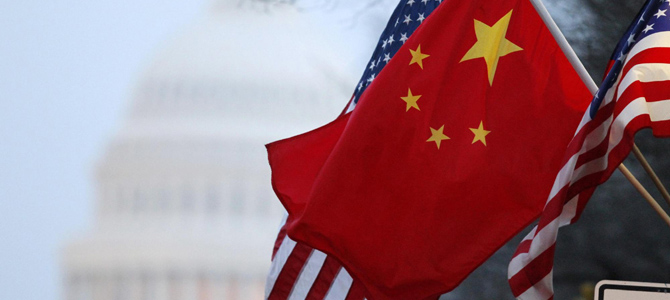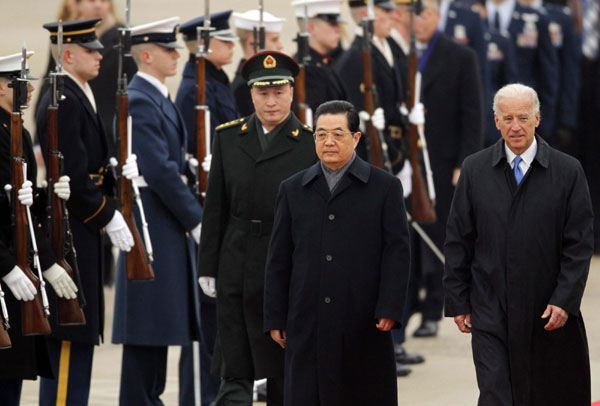M WAQAR..... "A man's ethical behavior should be based effectually on sympathy, education, and social ties; no religious basis is necessary.Man would indeed be in a poor way if he had to be restrained by fear of punishment and hope of reward after death." --Albert Einstein !!! NEWS,ARTICLES,EDITORIALS,MUSIC... Ze chi pe mayeen yum da agha pukhtunistan de.....(Liberal,Progressive,Secular World.)''Secularism is not against religion; it is the message of humanity.'' تل ده وی پثتونستآن
Wednesday, January 19, 2011
President Hu kicks off landmark US visit
President Hu Jintao arrived in Washington Tuesday afternoon (local time) for his four-day highly-exposed state visit to the United States.
Hu is expected to lay out his blueprint on US policy during his three days in Washington, where he'll meet with President Barack Obama, top legislators and business executives, followed by a stop in Chicago.
The US has made grandeous reception for Hu, with the White House busy preparing for a State banquet on Wednesday night, prior to a private dinner given by Obama to Hu on Tuesday night.
Chicago mayor Richard Daley also said it is a "big big big deal" for Hu to come to his city for a visit, where Chinese-funded enterprises have played a considerable role in the revival of the local economy through the financial crisis.
On arriving at Andres Air Force Base, Hu said in a written speech that "vast as it is, the Pacific Ocean has not stood in the way of the friendship between the Chinese and American people."
The international situation is undergoing profound and complex changes, and China and the US have growing common interests and responsibilities and enjoy broader prospects for cooperation, according to Hu.
"The purpose of my visit is to enhance mutual trust, promote friendship, deepen cooperation and move forward the positive, cooperative and comprehensive China-US relationship for the 21st century," said Hu.
Hu said he looks forward to have in-depth discussions with President Obama on bilateral relations and major international and regional issues of shared interest.
"The long-term, sound and steady growth of China-US relations is conducive to the fundamental interests of the Chinese and American people and to world peace and development," said Hu.
"China stands ready to work with the United States to actively develop China-US relations on the basis of mutual respect and mutual benefit and join all other countries in a common effort to build a harmonious world of lasting peace and common prosperity," said Hu.
US experts have also voiced their optimism for a constructive leadership summit.
President Emeritus of Asia Society Nicholas Platt said strategic trust is something both sides should be striving for.
"We should also look below the surface to what Chinese and Americans are actually doing together before making judgment of whether we have trust or not," said Platt.
According to Douglas Spelman, deputy director of Kissinger Institute on China and the United States (Woodrow Wilson International Center for Scholars), both sides now have to give priority to the underlining common interests and not let the differences override common interests.
"One other thing I think the visit is a good opportunity not just for the leaders and other officials to get together, but for people in China and the United States to feel that this is an important relationship. It has a public aspect as well as talk among themselves," said Spelman.
According to Knneth Lieberthal, director of John L. Thornton China Center, Brookings Institution, inevitably economic and trade issues will loom very large in the leadership talks.
According to Lieberthal, China is beginning a period of economic reconstruction at home, and Americans are doing exactly the same thing. And frankly, China and the US have enormous interest in the success of the other one in their reconstruction effort.
"So I think understanding those efforts better, figuring out how we can coordinate and be mutually helpful, those efforts are very important," said Lieberthal.
Lieberthal also reminded that the two countries share some security interests, especially the issue of nuclear proliferation.
In order to solve some existing issues between two militaries, Lieberthal suggested the two countries need to string out rules and have more effective communication between the two militaries.
Subscribe to:
Post Comments (Atom)


No comments:
Post a Comment